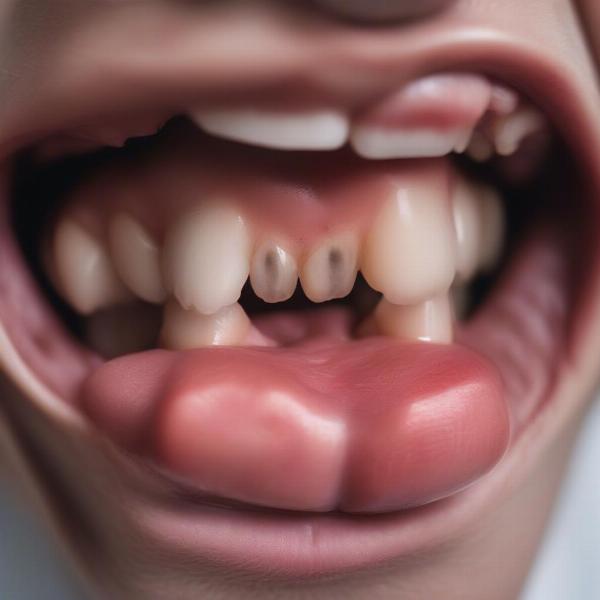A dog with fishy smelling breath can be concerning for any owner. While a bit of doggy breath is normal, a persistent fishy odor is often a sign of an underlying issue that needs addressing. Understanding the reasons behind this unpleasant smell is crucial to finding the right solution and ensuring your furry friend’s well-being. This article will explore the common causes of fishy breath in dogs and provide practical advice on how to manage and prevent it.
What Causes Fishy Breath in Dogs?
Several factors can contribute to fishy breath, ranging from dietary habits to more serious health concerns. Let’s delve into the most common culprits:
Dental Disease
Periodontal disease, including gingivitis and periodontitis, is the leading cause of bad breath in dogs. Bacteria buildup on the teeth and gums leads to inflammation and infection, producing a distinctive fishy odor.  Dog with dental disease showing inflamed gums and tartar buildup
Dog with dental disease showing inflamed gums and tartar buildup
Kidney Disease
When the kidneys aren’t functioning properly, waste products build up in the bloodstream, which can result in a fishy or ammonia-like odor on the breath. This is because the kidneys are unable to filter out toxins effectively. Early detection is crucial for managing kidney disease, so consult your veterinarian if you suspect this might be the cause.
Oral Tumors
While less common, tumors in the mouth can also cause fishy breath. These growths can become infected or ulcerated, leading to a foul odor. Regular veterinary check-ups are important for identifying any abnormal growths.
Dietary Issues
Sometimes, a simple change in diet can be the culprit. Certain types of fish-based dog food, although nutritious, can leave a lingering fishy smell on your dog’s breath. If you’ve recently switched to a fish-based diet, this might be the reason behind the fishy breath.
How to Treat Fishy Breath in Dogs?
Addressing fishy breath effectively depends on pinpointing the underlying cause. Here are some solutions:
Professional Dental Cleaning
Regular professional dental cleanings are essential for maintaining good oral hygiene and preventing dental disease. Your veterinarian can perform a thorough cleaning under anesthesia, removing tartar and plaque buildup. This is often the most effective way to combat fishy breath caused by dental problems.
Home Dental Care
Supplementing professional cleanings with regular home dental care can significantly improve your dog’s oral health. Brushing your dog’s teeth daily with enzymatic toothpaste specifically designed for dogs is highly recommended. dog stink spray
Dietary Changes
If you suspect your dog’s fishy breath is related to their diet, consult your veterinarian. They can recommend alternative food options that are less likely to cause odor. why do old dogs smell
Veterinary Examination
If the fishy breath persists despite dental care and dietary changes, a thorough veterinary examination is crucial. Your vet can conduct blood tests and other diagnostic procedures to rule out underlying health issues like kidney disease or oral tumors.
Preventing Fishy Breath in Dogs
Prevention is always better than cure. Here are some proactive measures you can take:
- Regular Dental Check-ups: Schedule regular dental check-ups with your veterinarian.
- Daily Toothbrushing: Brush your dog’s teeth daily with dog-specific toothpaste. dog shampoo smelly dog
- Dental Chews and Toys: Provide dental chews and toys to help remove plaque and tartar buildup.
- Balanced Diet: Feed your dog a balanced and nutritious diet, avoiding excessive fish-based foods if they contribute to the odor.
Conclusion
Fishy breath in dogs can be a sign of various underlying issues, from dental problems to more serious health concerns. Addressing the root cause is essential for effective treatment. Regular dental care, dietary adjustments, and veterinary check-ups are vital for preventing and managing this unpleasant odor, ensuring your furry friend maintains optimal oral health and overall well-being. Don’t ignore fishy breath – it’s your dog’s way of telling you something might be amiss. how to stop my dogs breath from smelling like fish
FAQ
- Is fishy breath in dogs always a sign of something serious? Not always. It can sometimes be related to diet, but persistent fishy breath should be checked by a veterinarian.
- How often should I brush my dog’s teeth? Ideally, daily.
- What kind of toothpaste should I use for my dog? Always use enzymatic toothpaste specifically formulated for dogs. Human toothpaste is toxic to dogs.
- Can dental chews replace regular toothbrushing? While dental chews can help, they shouldn’t replace brushing.
- What are the signs of kidney disease in dogs? Increased thirst and urination, lethargy, loss of appetite, and vomiting are some common signs.
- How can I tell if my dog has an oral tumor? Abnormal growths, swelling, bleeding, and difficulty eating are potential signs. Consult your veterinarian for diagnosis.
- What should I do if my dog’s fishy breath doesn’t go away? Consult your veterinarian for a thorough examination.
ILM Dog is a leading international online resource dedicated to providing expert advice and information on all aspects of dog care and wellbeing. From breed selection to senior dog care, we offer practical guidance based on the latest veterinary practices and trends. We specialize in breed information, health and medical care, training and behavior, nutrition, grooming, exercise, puppy care, senior dog care, dog travel, and product recommendations. Contact us for expert advice. Email: [email protected], Phone: +44 20-3965-8624. ILM Dog is here to support you and your canine companion on every step of your journey together.